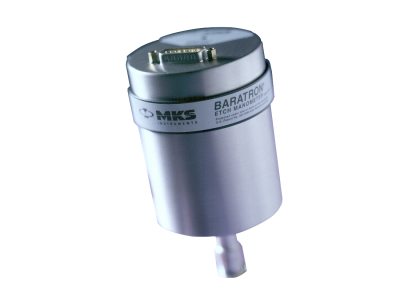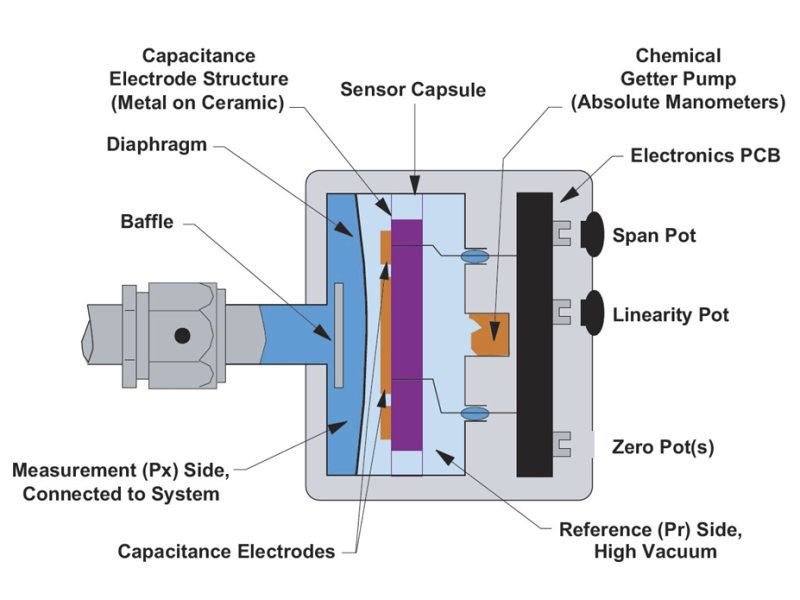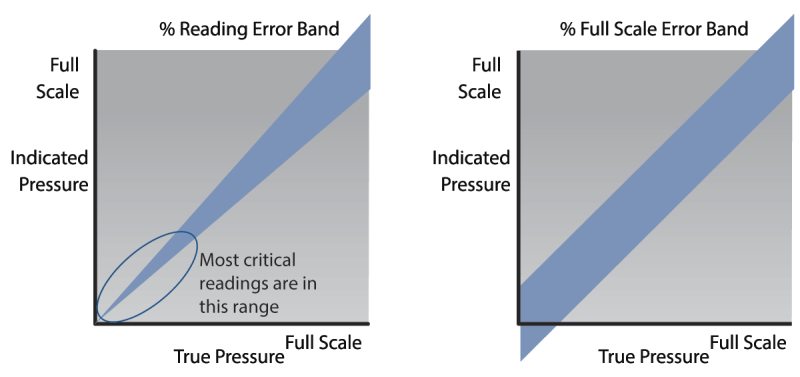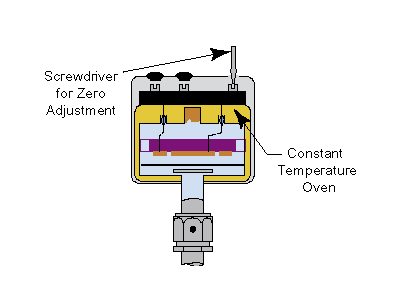MKS In-Stock Program: Over 250 products in stock and ready to ship across the United States!
E29H 0.02-1000 Torr Heated (45 or 100°C) Baratron® Capacitance Manometers with Etch Sensor
Overview
The E29H Baratron® Etch Manometer features structures in the sensor housing that eliminate process byproducts from depositing on the surface of the diaphragm, minimizing drift. The E29H Etch Manometer is temperature controlled to either 45°C or 100°C, and includes efficient temperature control electronics to provide superior long-term stability and repeatability.
- Temperature controlled to 45°C or 100°C for up to 0.12% of reading accuracy
- 0 to 10 VDC analog output proportional to absolute pressure
- Full Scale ranges low as 20 mTorr for precise low pressure measurement
- Measures total pressure directly, independent of gas composition
- Integrated sump for particle protection
- Inconel® wetted surfaces are corrosion-resistant
Products
| Compare | Description | Drawings, CAD & Specs | Availability | Price | |||
|---|---|---|---|---|---|---|---|

|
Heated Capacitance Manometer w/Etch Sensor, 0.1 Torr, 100°C, 8 VCR-F, DB15 w/Thread Lock, 0.50%/Rdg Accuracy, Vertical Calibration
|
E29H.1TBFL1B Heated Capacitance Manometer w/Etch Sensor, 0.1 Torr, 100°C, 8 VCR-F, DB15 w/Thread Lock, 0.50%/Rdg Accuracy, Vertical Calibration |
|
||||

|
Heated Capacitance Manometer w/Etch Sensor, 0.1 Torr, 100°C, NW16 ISO-KF, DB15 w/Thread Lock, 0.50%/Rdg Accuracy, Vertical Calibration, Status LED
$3,526
|
E29H.1TDFL6B Heated Capacitance Manometer w/Etch Sensor, 0.1 Torr, 100°C, NW16 ISO-KF, DB15 w/Thread Lock, 0.50%/Rdg Accuracy, Vertical Calibration, Status LED | $3,526 |
|
|||

|
Heated Capacitance Manometer w/Etch Sensor, 10 Torr, 100°C, 8 VCR-F, DB15 w/Thread Lock, 0.25%/Rdg Accuracy, Vertical Calibration
|
E29H11TBEL1B Heated Capacitance Manometer w/Etch Sensor, 10 Torr, 100°C, 8 VCR-F, DB15 w/Thread Lock, 0.25%/Rdg Accuracy, Vertical Calibration |
|
||||

|
Heated Capacitance Manometer w/Etch Sensor, 10 Torr, 45°C, NW16 ISO-KF, DB15 w/Thread Lock, 0.12%/Rdg Accuracy, Vertical Calibration, Status LED
|
E29H11TDCJ2B Heated Capacitance Manometer w/Etch Sensor, 10 Torr, 45°C, NW16 ISO-KF, DB15 w/Thread Lock, 0.12%/Rdg Accuracy, Vertical Calibration, Status LED |
|
||||

|
Heated Capacitance Manometer w/Etch Sensor, 0.02 Torr, 45°C, NW16 ISO-KF, DB15 w/Thread Lock, 0.25%/Rdg Accuracy, Horizontal Calibration, Status LED
|
E29HU2TDEJ6B Heated Capacitance Manometer w/Etch Sensor, 0.02 Torr, 45°C, NW16 ISO-KF, DB15 w/Thread Lock, 0.25%/Rdg Accuracy, Horizontal Calibration, Status LED |
|
||||

|
Heated Capacitance Manometer w/Etch Sensor, 0.05 Torr, 45°C, 8 VCR-F, DB15 w/Thread Lock, 0.50%/Rdg Accuracy, Vertical Calibration
|
E29HU5TBFL1B Heated Capacitance Manometer w/Etch Sensor, 0.05 Torr, 45°C, 8 VCR-F, DB15 w/Thread Lock, 0.50%/Rdg Accuracy, Vertical Calibration |
|
Configuration Options
The following options are available for E29H Baratron® Heated Absolute Capacitance Manometers
Ordering Code Example: E29H01TBEJ2B
| Configuration Option | Option Code |
|---|---|
| E29H Absolute Capacitance Manometer. | E29H |
Full Scale Range |
|
| 0.02 Torr (not available with 100°C) | U2T |
| 0.05 Torr | U5T |
| 0.1 Torr | .1T |
| 0.25 Torr | RET |
| 1 Torr | 01T |
| 2 Torr | 02T |
| 10 Torr | 11T |
| 20 Torr | 21T |
| 100 Torr | 12T |
Fittings |
|
| 0.5 in. OD Tube | A |
| 8 VCR female | B |
| 1.33 in. OD CF | C |
| NW16 ISO-KF | D |
| 8 VCO female | E |
| 2.75 in. OD CF | L |
| NW25 ISO-KF | Q |
Accuracy |
|
| 0.12% of Reading (not available with 100°C) | C |
| 0.15% of Reading (not available with 100°C) | D |
| 0.25% of Reading | E |
| 0.50% of Reading | F |
Temperature |
|
| 45°C | J |
| 100°C | L |
Options |
|
| Standard Configuration, vertical calibration | 1 |
| Temperature/Heater Status, vertical calibration | 2 |
| External Zero/Vertical Calibration | 3 |
| Heater Status/External Zero/Vertical Calibration | 4 |
| Standard Configuration/Horizontal Calibration | 5 |
| Optional Heater Status Indication/Horizontal Calibration | 6 |
| External Zero/Horizontal Calibration | 7 |
| Heater Status/External Zero/Horizontal Calibration | 8 |
Connector |
|
| 15 pin Type "D" with Thread Locks | B |
| 15 pin Type "D" with Slide Locks | P |
Specifications
-
TypeVacuum/pressure Transducer
-
Measurement TypeAbsolute
-
Sensor TemperatureControlled to 45°C or 100°C
-
Full Scale Pressure Ranges0.02 (45°C only), 0.05, 0.1, 0.25, 1, 2, 10, 20, 100, 1000, 2000, 5000, 10000, 15000, 20000, 25000 Torr
-
Analog Output0-10 VDC into >10K Ω load
-
Analog Connector9-pin D-sub
-
Span Temperature Coefficient0.02% of Reading/°C
-
Operating Temperature Range45°C version: 15-40°C
100°C version: 15-50°C -
Volume6.3 cc
-
Warm-up Time2 hours for 1-25,000 Torr ranges
4 hours for ranges < 1 Torr -
Overpressure Limit45 psia (310 kPa) or 120% Full Scale, whichever is greater
-
Exposed MaterialsInconel®
-
Power Requirements±15 VDC±5% @ 0.25 Amps (0.6 Amps for 100°C version)
-
ComplianceCE
Features
Baratron® Capacitance Manometer Technology
Capacitance manometers are electro-mechanical gauges that can measure both pressure and vacuum. The capacitance gauge translates a pressure-modulated movement in a thin diaphragm into an electrical signal proportional to the pressure. The pressure sensor is the thin diaphragm that is exposed to the pressure or vacuum being measured via the inlet tube. An electrode is mounted in the reference cavity behind the diaphragm. Pressure differences between the process and the reference cavity deflect the diaphragm slightly, changing the distance between it and the electrode. Variations in this distance produce variations in the capacitance between the diaphragm and the electrode creating an electrical signal that is proportional to the pressure change. Since differences in the capacitance signal are produced by physical changes within the manometer and not by changes in the gas properties, pressure measurements by the capacitance manometer are independent of the composition of the gas being measured.
Internally Heated to 45°C or 100°C
These capacitance manometers are temperature controlled to 45°C or 100°C for improved accuracy. Unheated versions are exposed to ambient temperature variations which can degrade the sensor accuracy. These devices have the sensor enclosed in a volume that is maintained at a constant temperature above ambient. This solution improves the manometer’s accuracy and repeatability and lowers instrument drift by reducing or eliminating process contamination within the manometer. Heated manometers are recommended for applications that require maximum accuracy and repeatability, operate above ambient temperature and for those processes that employ hot gases.
Absolute Pressure Measurement
These Baratron® pressure transducers are referenced to vacuum for absolute pressure measurement. Applications include: vacuum furnaces, freeze-drying of fruits and vegetables, gas lasers, automotive component testing, bottle coatings, and vacuum distillation.
All-Inconel® Wetted Surfaces
These pressure transducers feature all Inconel® construction of the pressure sensor allowing it to operate without damage in virtually any chemical environment, including exposure to halogens, deionized water and steam, and ozone.
0 to 10 VDC Proportional Analog Output
These Baratron® capacitance manometers feature a high-level 0-10 VDC analog output signal that is linear with pressure. This analog output can be interfaced with an MKS pressure controller, an MKS power supply/display instrument, or any instrument that meets these requirements.
9-pin Type "D" Pin-outs
| Pin | Description |
|---|---|
| 1 | Pressure Output |
| 2 | No Connection |
| 3 | No Connection |
| 4 | +15 VDC |
| 5 | -15 VDC |
| 6 | No Connection |
| 7 | External Zero |
| 8 | Pressure Common |
| 9 | Power Common |
Recommended for Etch Processes
MKS has implemented solutions within the manometer’s pressure sensing element to minimize the effects of process byproducts and process gases. For processes that generate large quantities of condensable byproducts, MKS recommends the etch baffle sensor that significantly reduces the ability of byproducts to reach the sensor, minimizing process-induced zero drift. For very low pressure processes where fluorine burn-in is the main issue, MKS recommends the fluorine friendly (FF) sensor offering the ultimate in short- and long-term stability in fluorine chemistry.
Resources
Literature
- E29H Heated (45°C or 100°C) Baratron® Capacitance Manometer with Etch Sensor (1.5 MB, PDF)
- Analog 600 Series Absolute Baratron® Capacitance Manometer Selection Guide (2.9 MB, PDF)
Manuals
- MKS E29H Transducer Manual (659.4 kB, PDF)
- 629 and E29 Capacitance Manometer Pin-outs (21.8 kB, PDF)
Drawings & CADs
- E29 Dimensional Drawing (126.9 kB, PDF)




 Ultra-High Velocity
Ultra-High Velocity